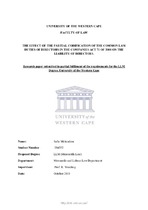The effect of the partial codification of the common law duties of directors in the companies Act 71 of 2008 on the liability of directors
Abstract
The global financial crisis resulted in a corporate collapse in different parts of the world. The global financial crisis was caused by poor governance. Consequently many countries, including South Africa, began to place more emphasis on good governance. The framework and guidelines for the development of good governance in South African company law was published by the Department of Trade of Trade and Industry (hereafter DTI) in a document referred to as The South African Company Law for the 21st Century: Guidelines for Corporate Law Reform (hereafter the DTI Policy Document) published by the DTI. The DTI Policy Document recognised the need for a regulatory framework within which enterprises operate to promote growth, employment, innovation, stability, good governance, confidence and international competitiveness. In order to further develop governance, the effectiveness of directors’ standards as well as the liability of directors was also said to have developed.
Prior to the development of South African corporate law, liability of directors was to a large extent governed by the common law and the King Codes, despite the existence of the Companies Act 61 of 1973 (as amended). As of the 1st of May 2011, corporate law in South Africa appears to have dramatically changed the duties and liabilities of directors. The 1st of May 2011 marked the implementation of Companies Act 71 of 2008 (hereafter the Act).
The Act is written in plain language in an attempt to make it more accessible and align it with international trends. The Act has also theoretically changed the roles and duties of directors as well as the liability that they may face in that it potentially changes the existing common law and alters policies and philosophies of corporate law in general.
The Act partially codifies the common law and introduces the business judgement rule to South Africa. The business judgment rule will draw a balance between the directors’ ability to steer a company and the shareholders' right to hold directors accountable for their decisions. It is perceived as a mechanism that can be used to balance the tension between these opposing rights.

